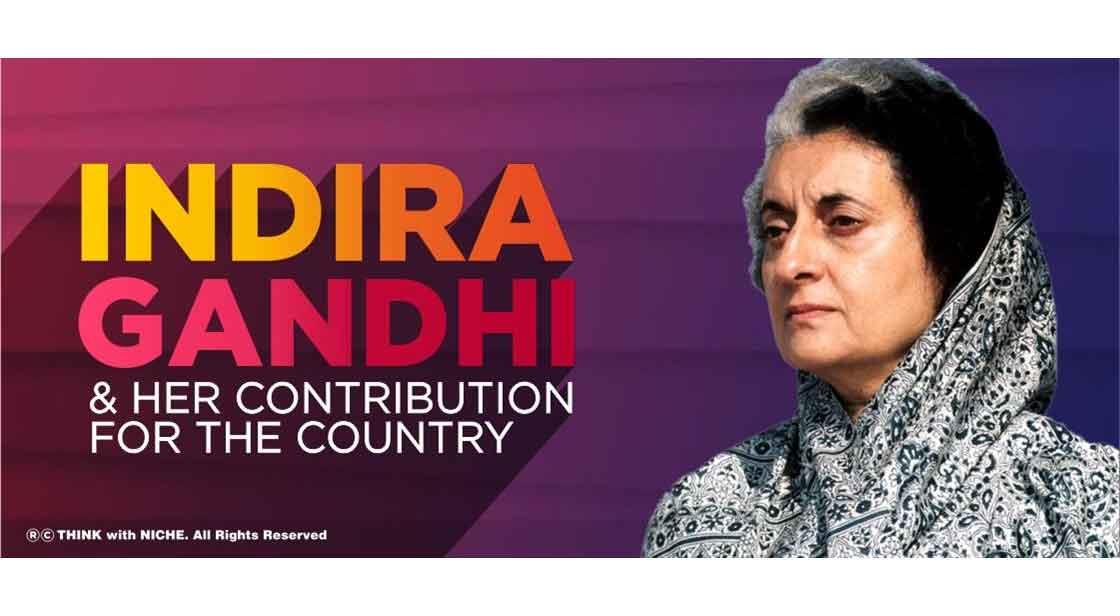Indira Gandhi and her contribution for the country

Blog Post
Indira Gandhi, a prominent figure in Indian politics, left an indelible mark on the nation through her leadership and contributions. Her early life and upbringing heavily influenced her political career, shaping her into a resilient and determined leader. Born on November 19, 1917, in Allahabad, Uttar Pradesh, she was the only child of Jawaharlal Nehru, the first Prime Minister of India, and Kamala Nehru.
Indira Gandhi, an iconic figure in Indian history, played a pivotal role in shaping the destiny of the nation. As the daughter of Jawaharlal Nehru, the first Prime Minister of India, she was destined for a life of public service. Indira Gandhi's journey as a stateswoman and her contributions to India are worth exploring. This article delves into her biography, vision, philosophy of life, and her remarkable ontribution for the country
Let us delve into the transformative policy reforms initiated by Indira Gandhi, the first female Prime Minister of India. Gain valuable insights into how her leadership ushered in significant changes and shaped the socio-political landscape of the nation.
Indira Gandhi, daughter of India’s first Prime Minister, Jawaharlal Nehru, was the 3rd PM, and the first and only female prime minister of India. She was undermined by many, as she was a woman running the cabinet of male ministers but her boldness and strategical decision making made people realise her potential. She had contributed majorly to the development of the country.
Biography of Indira Gandhi
Indira Gandhi's early life and upbringing heavily influenced her political career. Born on November 19, 1917, in Allahabad, she witnessed firsthand the struggle for Indian independence and the sacrifices made by her father Jawaharlal Nehru and other freedom fighters. Her education, both in India and abroad, broadened her horizons and nurtured her passion for social justice.
Growing up in a household deeply involved in the struggle for Indian independence, Indira Gandhi was exposed to the fervor and sacrifices of her father and other freedom fighters. This upbringing instilled in her a strong sense of patriotism and an unwavering commitment to the welfare of the nation.
Indira Gandhi's education played a crucial role in shaping her worldview and nurturing her passion for social justice. She received her early education at the Modern School in Delhi, where she imbibed progressive ideas and imprinted her leadership qualities. Later, she pursued higher education at the University of Oxford in England, where she developed a deeper understanding of international affairs and politics. These formative years broadened her horizons and equipped her with the knowledge and skills necessary for her future political endeavors.
Married to Feroze Gandhi, a journalist and political activist, Indira Gandhi faced numerous challenges as a woman in a male-dominated political landscape. However, she defied societal expectations and emerged as a charismatic and influential leader in her own right.
Indira Gandhi's political career gained momentum when she joined the Indian National Congress party, which played a pivotal role in the struggle for independence. Under the guidance of her father, she quickly rose through the ranks and became an integral part of the party's leadership. Her sharp intellect, strong determination, and excellent organizational skills earned her respect and admiration within the party.
In 1966, following the sudden demise of Lal Bahadur Shastri, Indira Gandhi assumed the role of India's Prime Minister. As the country's first female Prime Minister, she faced immense challenges, both domestically and internationally. She implemented various policies aimed at addressing poverty, promoting agricultural self-sufficiency, and fostering economic development. However, her tenure was not without controversy and criticism. The declaration of a state of emergency in 1975 and subsequent suspension of civil liberties drew criticism from those who believed it undermined democracy.
Throughout her political career, Indira Gandhi exhibited strong leadership qualities and a firm commitment to social justice. She championed the cause of the underprivileged and marginalized sections of society, working towards reducing poverty and inequality. Her emphasis on empowering the rural population through land reforms and providing access to education and healthcare contributed to the overall development of the nation.
Indira Gandhi's political journey was marked by significant achievements as well as moments of turmoil. Her strong leadership during the Bangladesh Liberation War in 1971, which resulted in the creation of Bangladesh, showcased her diplomatic prowess and commitment to regional stability. However, her assassination in 1984 shocked the nation and left a void in Indian politics.
Despite the controversies surrounding her tenure, Indira Gandhi's contributions to the nation are undeniable. Her unwavering commitment to the welfare of the people, especially the marginalized, and her relentless pursuit of social justice continue to inspire generations of leaders. She remains an iconic figure in Indian politics, symbolizing strength, determination, and a visionary approach to governance.
Vision of Indira Gandhi
Indira Gandhi possessed a strong vision for a progressive and self-reliant India. She aimed to transform the country into a global power, focusing on economic development, self-sufficiency, and social welfare. Her vision included empowering marginalized sections of society, promoting gender equality, and bridging the rural-urban divide.
Philosophy of Life:
Indira Gandhi's philosophy of life revolved around the principles of resilience, courage, and dedication. She firmly believed in the power of democracy, secularism, and inclusive governance. Despite facing numerous challenges and criticism, she remained committed to her ideals and steadfast in her resolve to serve the nation.
Also Read: Kamala Harris– The Pinnacle of Women Empowerment
Indira Gandhi and her contribution for the country
Indira Gandhi's tenure as Prime Minister witnessed both significant achievements and controversies. She implemented bold policies and initiatives that left a lasting impact on India's socio-political landscape.
1. Economic Reforms:
Indira Gandhi implemented economic reforms aimed at achieving self-sufficiency and reducing dependence on foreign aid. The nationalization of banks and the Green Revolution were among her notable economic policies that transformed India's agricultural sector and brought stability to the banking system.
2. Empowering the Marginalized:
Indira Gandhi championed the cause of the marginalized and downtrodden. She introduced pro-poor policies such as the Garibi Hatao (Eradicate Poverty) program, which aimed to uplift the socio-economic conditions of the underprivileged. Her focus on rural development and land reforms helped alleviate poverty and improve the lives of millions.
3. National Security and International Relations:
Indira Gandhi's leadership was tested during challenging times, including the Indo-Pak War of 1971, which resulted in the creation of Bangladesh. She displayed strong leadership and strategic acumen, earning her the respect of the international community. Her role in promoting global peace and non-alignment further elevated India's stature on the world stage.
4. Bank Nationalisation Ordinance
In a 7 August 1969 speech on All India Radio, Prime Minister Indira Gandhi called for control over the commanding heights of the economy to justify an ordinance that nationalised banks. The ordinance was turned into law by Parliament, under the Banking Companies (Acquisition and Transfer of Undertakings) Act of 1970, deemed to have come into force on 19 July 1969,14 banks were nationalised. Today the number stands at 12 after a spate of mergers instead of 27 in 2017.
5. Abolition of Privy Purse
In consideration of acceding to the Indian union, the Government of India granted to them a ‘privy purse’, which was a specified sum of money that was payable annually to the rulers of such States. The quantum of the payment was determined by the States revenue. Such payments were guaranteed by a provision in the Constitution of India. ‘Privy purse’ was abolished in 1971 in the form of the 26th Amendment to the Constitution of India 1971. Mrs Gandhi argued the case for abolition based on equal rights for all citizens.
6. A second round of land reforms was undertaken by Mrs Gandhi in 1972.
The land reform measures failed to match the legitimate expectations which were first fostered among millions of cultivators during the national movement. A ceiling was imposed on land holdings and it varied depending on the irrigation status of the land. It was lower for irrigated land (10-18 acres) and 54 acres for unirrigated land. Excess land was to redistributed to landless agricultural workers esp. SC/ST. By March 1985 nearly 7.2 million acres of surplus land was redistributed to about 3.3 million beneficiaries.
7. Green Revolution
In the 1960’s when IG took charge Indian economy was in shambles- two wars- 1962 and 1965 followed by two successive monsoon failures 1965-66 led to a 20% fall in agricultural production. Famine conditions prevailed with severe drought in Bihar. Foreign exchange was at an all-time low. India was out with a begging bowl and was forced to accept food grains from the USA as aid. To add to all this genocide in East Pakistan- some 10 million refugees had fled to India. oil shock of 1973 when oil prices again doubled and the disastrous harvest of 1999-70 caused by the worst drought since independence.
Indira Gandhi's legacy
Indira Gandhi's legacy is multifaceted and impactful. While her tenure as Prime Minister faced criticism and controversies, her contributions to India cannot be undermined. She inspired generations of women to enter politics, and her commitment to democracy and social justice remains an enduring legacy.
Conclusion:
Indira Gandhi's life and contributions to India continue to inspire and shape the nation's trajectory. Her vision for a self-reliant and inclusive India, coupled with her courage and determination, left an indelible mark on the country's history. As a true stateswoman, she dedicated her life to the service of the nation and championed the cause of the marginalized. Indira Gandhi's leadership and her enduring legacy serve as a beacon for future
You May Like
EDITOR’S CHOICE












